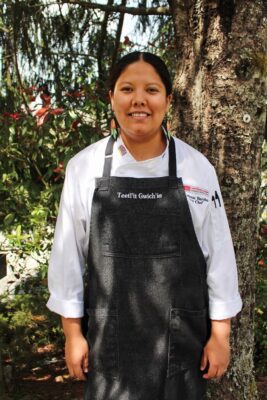Name: Steph Baryluk
Location: Tsawwassen, BC Canada
Education/background: Red Seal Chef with a background working in oil camps, hotels, restaurants, catering, and senior homes with a specialty in Indigenous-inspired menu creation; Creator of the Indigenous foods program “Rooted” at Simon Fraser University
Business name: MRS B’S JERKY
Tribal affiliation: Teetl’it Gwich’in

What led to your passion for Indigenous foods?
Leaving my home community after high school, there was always a disconnect. I spent years trying to figure out how to fill that void. No longer being surrounded by my community and culture ultimately led me to the food industry. My whole life I was fortunate enough to have a Gwich’in family harvesting and processing our meals. From as far back as I can remember, my Jijuu (grandmother) would always have food ready to be served for any visitors who entered her home. It’s how we greet people, connect with people and show our respect.
I am very fortunate to have found my path in sharing our culture through food. As Indigenous peoples our culture was meant to be taken away from us. Both my parents are residential school survivors. The more I share our stories, cuisine and traditions the more our culture can continue to thrive. This work is so important because my hope is to inspire other Indigenous people to do the same. Chase your dreams, go after your goals and never stop trying.
Why do you think it’s important to make traditional foods accessible for Natives?
For Indigenous peoples who may be disconnected or who may not know their Indigenous culture, food is a way to build that connection again. Our food is who we are. For years we lived off the land and ate our traditional foods. Our ancestors knew and created such a beautiful way of life that was disrupted. I feel as though we are lost now in the more modern way. Going back to what we knew or learning what we used to do will only benefit us spiritually, mentally, and physically.
What is the importance of an Indigenous diet for a healthy lifestyle?
It’s a proven lifestyle. In the Arctic we live in one of the harshest climates, but we have been on these lands for thousands of years. Our Gwich’in people lived and moved with the animals to survive. Having untouched land, everything was organic. Only after our people were discovered did we start to experience so many health issues. Still today our people face high amounts of diabetes and obesity. We are deeply connected to our traditional foods. I am proud my community still practices hunting, fishing and trapping and have Whitefish, Moose and Caribou as staples of our diet.
What ways are you involved in the education, restoration and accessibility of traditional Native foods?
Creating an Indigenous Food Program “Rooted” with Simon Fraser University has given me a platform to share our Indigenous food. Each recipes comes with a QR code where students or the public can scan and learn more on the products or traditions associated with each dish.
I also host receptions specializing in Indigenous-inspired menus, in-person teaching kitchens, and virtual teaching kitchens. I enjoy sharing my Teetl’it Gwich’in culture, one meal at a time.
How can community members be involved and support the cause of restoring and protecting Indigenous food systems?
Reach out to your local Indigenous groups. Start to build those connections. Most importantly, listen to our Indigenous elders. In the Arctic we have the Porcupine Caribou herd that’s been sustaining our Gwich’in people in the Yukon, Northwest Territories and Alaska for years. If we want the caribou to continue to sustain us, we need to protect them. Only take what is needed and do not waste.
